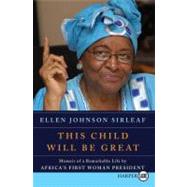In January 2006, after the Republic of Liberia had been racked by fourteen years of brutal civil conflict, Ellen Johnson Sirleaf—Africa's "Iron Lady"—was sworn in as president, an event that marked a tremendous turning point in the history of the West African nation.
In this stirring memoir, Sirleaf shares the inside story of her rise to power, including her early childhood; her experiences with abuse, imprisonment, and exile; and her fight for democracy and social justice. This compelling tale of survival reveals Sirleaf's determination to succeed in multiple worlds: from her studies in the United States to her work as an international bank executive to her election campaigning in some of Liberia's most desperate and war-torn villages and neighborhoods. It is also the story of an outspoken political and social reformer who, despite danger, fought the oppression of dictators and championed change. By sharing her story, Sirleaf encourages women everywhere to pursue leadership roles at the highest levels of power, and gives us all hope that, with perseverance, we can change the world.








